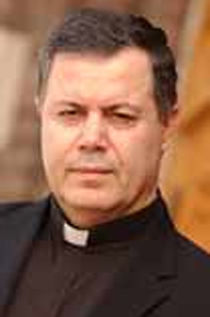
By: KARRIS GOLDEN
WATERLOO ,IA— Left unchecked, Christian populations could be erased from the Holy Land, according to a Maronite Catholic priest from the region.
The Rev. Emanuel Nakhle spoke recently at the Waterloo Rotary Club, describing current events through political, historical, social and religious lenses.
Nakhle serves Holy Family Maronite Church, a Lebanese congregation in Mendota Heights, Minn. He is fluent in Arabic, French, English and Italian. He also speaks Syriac Aramaic, Jesus’ native tongue.
The Maronite Church is the largest Christian denomination in Lebanon. It is united with the Roman Catholic Church but retains historic rituals, practices and traditions.
Nakhle came to the Cedar Valley through the American Association of Lutheran Churches and its retired bishop, the Rev. Dr. Duane Lindberg. The AALC forged the relationship with the Maronite denomination out of a desire to support the Middle East’s historically Christian populations.
“You have a Lutheran body giving money to a Roman Catholic body so close to the 500th anniversary of the Reformation; if that isn’t a miracle, I don’t know what is,” said Lindberg in introducing Nakhle.
Nakhle believes the current threat of fundamentalist Islamic groups and mismanagement of post-civil war Syria could obliterate the dwindling Christian population in Lebanon.
“The war in Syria caused civilian people to flee their homes and towns out of the surrounding countries, into Turkey, Jordan and Lebanon,” said Nakhle. “Among the faith communities, Christians paid … the highest price (for the war), having been completely cleansed out from ISIS areas and from areas occupied by what’s defined ‘moderate opposition.’”
The loss of Lebanon’s Christian heritage would be dire, he added. “Christianity started in the Holy Land and spread first to the countries around, including Lebanon or Phoenicia, Syria and Mesopotamia, or Iraq,” said Nakhle. “The Apostles crossed the shores of Phoenicia to reach Antioch, the Roman capital of Syria.”
For decades, the Middle East has been marked by sectarian conflicts. However, the past 15 years have given rise to groups that exploit increased religious intolerance and fanaticism, said Nakhle.
“Christian communities struggle to survive in the midst of the rise of violence and radical Islam in the region today,” said Nakhle. “The situation of war in the Middle East is constantly changing.”
In fact, he said some of his research became “outdated” with the recent fall of the Islamic State. He credits U.S. President Donald Trump and Russian President Vladimir Putin with this. He’s also grateful to the two leaders for publicly supporting Lebanon and a Christian presence there.
Prior to Syria’s civil war, Lebanon’s Christian population was growing toward 50 percent of the nation. This shifted with the refugee crisis, which created an influx of Syrians into Turkey, Jordan and Lebanon.
Lebanon, a country of 4 million, took in nearly 2 million refugees, of which 80 percent are Sunni Muslims, Nakhle explained.
“With this exponential increase of refugees (into Lebanon), the Christians face a threat of demographic change which affects their future and destiny,” he added. “Christianity in Lebanon is the only relevant Christianity of what’s left of the Holy Land.”
Lebanese Christians emigrate to avoid the country’s overcrowding, strained economy and religious persecution, said Nakhle. The scenario has played out across the Middle East since the early 20th century. Christians once exceeded 20 percent of the region’s population and have now dropped to less than 4 percent, according to the BBC.
Lebanon attempts a religiously balanced government by mandating the president must be Christian, prime minister Sunni Muslim and speaker of parliament Shi’a Muslim. In this and support from nations like the United States, Russia and France, Nakhle sees hope.
“To prevent the collapse of what’s left of Christianity in the Middle East and especially in Lebanon can be done in different levels,” he explained.
Waterloo Cedar Falls Courier

Leave a Reply
You must be logged in to post a comment.